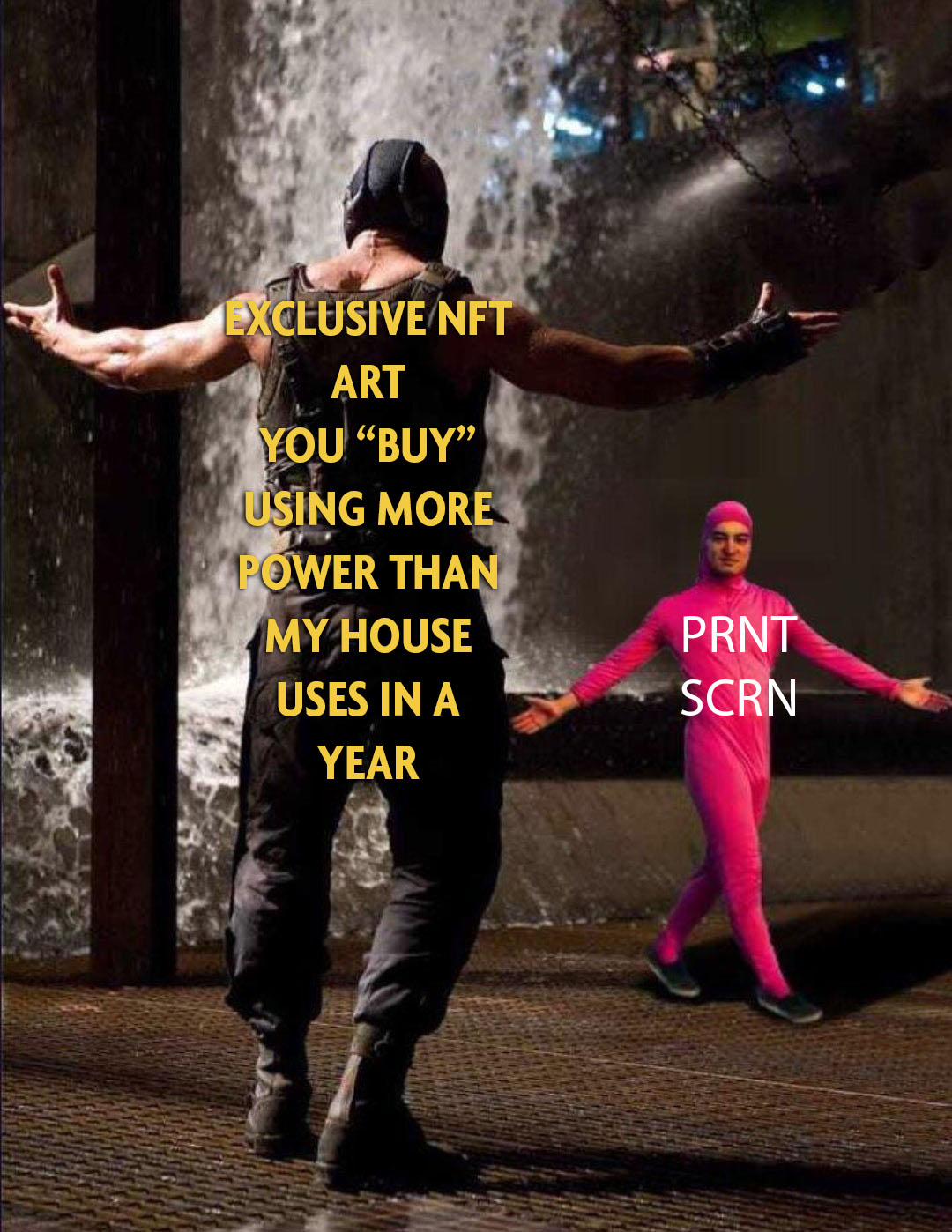Cryptocurrency, Blockchain and buy Roujcoin now [ROU]
-
I mean this is exactly the real art world all over innit.poprock wrote:Shady people will always find ways to launder money in plain sight.
-
No argument there.
-
Show networks
- OOH_HOLD_DAT
- Xbox
- MM Jeremy Wade
- PSN
- SUPERJEDININJA
- Steam
- Roujin5555
Send messageIt does seem like NFT is trying to solve a "real world" problem that isn't applicable in the digital space, for precisely the reason Pink Guy is demonstrating above.
I know there are digital artists who earn their livings from collectivised commision work through patreon, where users subscribe each month to support the artist and/or vote on what they want to see, etc. There are also digital artists who stream a lot of their work as it's being developed and then there are artists who run their own stores selling prints or whatever merch with their stuff on it.
It's certainly less of an idyllic vision than someone in a scruffy loft studio somewhere, throwing paint at a canvas however they like and selling their work through galleries, but it's not really a million miles away.
Caveat - I'm not shitting on artists here or denigrating the creative process, I wish I had the drive and the vision to be able to make myself take images from inside my head and lay them out digitally or physically and have them be a rewarding, fulfilling, proper piece of artwork."Let me tell you, when yung Rouj had his Senna and Mansell Scalextric, Frank was the goddamn Professor X of F1." -
Okay, we can get into the bigger picture too.
In the art world (as in fine art, the gallery and auction system, etc) digital art has one advantage. Just one. It’s reproducible in a way that no other art is. Digital art collapses the very concept of originality. There’s no distinction between the original and a copy. They’re not just functionally identical, they’re actually identical.
Sellotaping a method of assigning authenticity to digital art is a fucking hiding to nothing because it removes the one and only advantage digital art has.
Thank you for coming to my TED talk, etc etc. -
Show networks
- OOH_HOLD_DAT
- Xbox
- MM Jeremy Wade
- PSN
- SUPERJEDININJA
- Steam
- Roujin5555
Send messageI can't believe he didn't even show us one authenticated meme, what a rip off."Let me tell you, when yung Rouj had his Senna and Mansell Scalextric, Frank was the goddamn Professor X of F1." -
Couldn’t afford the rights clearance.
-
It’s been interesting to read the thinkpieces about the parallels between the crypto art scene and traditional art markets and movements. Fun little microcosm, hopefully hicetnunc gains popularity to knock down the ecoimpact of the whole process.
-
I mean, artificial digital scarcity is about as good as you can do with blockchain I guess.
Fun for the crypto speculators to be able to use their digital speculation tokens to speculate on other digital speculation tokens and over-leverage that bubble. Social media-active artists need to make hay while the sun shines, but it’s quite soured a lot of digital art Twitter. Money changes things, same as it ever was. -
What will start to happen is digital artists won't show the art they are selling in its full form. It will be cropped, watermarked, low resolution whatever.
The only people with the true version will be the artist and the owner, both of whom are invested in not making one to one copies of it. -
I’m not so sure about that - the token is still the unique token, and given it’s all about using social following to hype the “drop”/auction the artists so far have been showing as much as they can.
Some of the interactive pieces are hyped as “only the buyer gets this feature” I guess, so some of the node.js or p5.js creative coders/procedural artists might become more private? but the more interesting generative galleries/auction sites use the generative aspect to seed “unique” prints of the piece that people can buy.
Given that the collectibility/worth is almost entirely derived from social media presence/reputation, hiding their light under a bushel isn’t going to help crypto artists imho. -
Wait until the digital archivists weigh in on the conversation. (It might take a few years, they’re a careful, slow to act, bunch.) When that token of authenticity is all that’s left, because your animated digital Pepe meme can’t be viewed on anything but ancient 2021-era computing tech, and your million-dollar investment is suddenly not worth the inheritance tax your kids have to pay to own it, what happens then? Who can they complain to? The court case is gonna be a cracker.
-
NFTs are a complete mess.
"...NFTs are designed to give you something that can’t be copied: ownership of the work (though the artist can still retain the copyright and reproduction rights, just like with physical artwork). To put it in terms of physical art collecting: anyone can buy a Monet print. But only one person can own the original...."
Theres a video by someone called beeple that someone paid $6.6mil for. Any of us can still go download the video for free and keep a copy. Beeple still owns the copyright and reproduction rights but the person who paid $6.6mil "owns" the original (apparently) as they have the NFT.
However what blockchain was that NFT created on? Is it recognized by any governing body in the USA or any other country when it comes to digital art rights? No. As far as i understand it there are no globally agreed definitions, laws etc on digital art rights especially when backed by a NFT. So its the wild west, lawless and speculation run amok. Anyone who pays any money for any digital arr backed by a NFT at present is a fool.
On a side note Blockchain (cryptocurrency) aside has a massive future and can do alot of good in the world (electricity demands aside, but then electric cars are a false economy anyway). A year or two i did a presentation on the future and uses of blockchain to a packed auditorium (which surprised me) for work. Unfortunately in the Q&A part it was apparently from the questions asked that so many people just assoicate blockchain technology with cryptocurrencies and thats all. Theres alot of good uses for blockchain tech, digital art and NFTs isnt one of them in my humble opinion. -
Dinostar77 wrote:Theres alot of good uses for blockchain tech …
Dino hates the planet, confirmed. -
Spoiler:
-
Dinostar77 wrote:However what blockchain was that NFT created on? Is it recognized by any governing body in the USA or any other country when it comes to digital art rights? No. As far as i understand it there are no globally agreed definitions, laws etc on digital art rights especially when backed by a NFT. So its the wild west, lawless and speculation run amok. Anyone who pays any money for any digital arr backed by a NFT at present is a fool.
Can’t all of this be applied to cryptocurrency?
Bitcoin has value because people agree that it has value. Isn’t the same true of NFT? -
Well, I dont agree it has value. That should put an end to the mattee.
-
Aren’t the tokens not valuable in themselves but are essentially unhackable unique signatures such that you can’t replicate them without everyone knowing something iffy is happening?
-
Diluted Dante wrote:Well, I dont agree it has value. That should put an end to the mattee.
Unfortunately for you, not everyone has to agree that something has value for it to have value. If they did, the entire pro wrestling industry would be worthless. -
The pound, dollar and yen have value because people say they have value. I doubt this is the place for a wider discussion about whether money was ever a good idea.
NFTs are not intended as currency. They’re intended as a ‘thing’, which you can buy, own or trade.
Or rather, as a certificate that proves you have a thing. Which I suppose does make them a little bit more like currency. Hmmm. Still not quite as abstract though. Money is a promise that you own a thing that doesn’t actually exist. An NFT is intended as proof that you own a thing that does exist. Except most of them only exist digitally. Hmmm. This argument gets tricksy quite quickly. -
All the above bollocks aside, and assuming this particular genie can’t be put back in its bottle (where it belongs if you ask me), I reckon the whole NFT thing has legs when applied to the real, physical, art world. Authenticating art and antiquities is a big industry and this would make it simpler. Sod having a certificate from Sotheby’s, let’s get a secure digital certificate going that bakes-in a percentage fee of future sales going back to the creator/owner/artist/whoever.
But, y’know, let’s not allow things to get that far before addressing the environmental elephant in the room. Every kind of blockchain needs to be rethought from the ground up because this ‘exponential work’ thing could kill us all. -
poprock wrote:Wait until the digital archivists weigh in on the conversation. (It might take a few years, they’re a careful, slow to act, bunch.) When that token of authenticity is all that’s left, because your animated digital Pepe meme can’t be viewed on anything but ancient 2021-era computing tech, and your million-dollar investment is suddenly not worth the inheritance tax your kids have to pay to own it, what happens then? Who can they complain to? The court case is gonna be a cracker.
I think the whole Pepe Meme thing is quite reductive.
Every art movement has had its angry man shouting at cloud and you are in danger of being said angry man this time round.
Archiving and safe keeping. Well things worth millions of dollars dont tend to get forgotten about. How much time, money, energy goes into maintaining and restoring physical art? If we can store paintings in warehouses with humidity and temperature regulators, take them out once a decade to touch up the paint work after a fortnight of cleaning to put them back again I think we can keep jpgs going. -
I did call myself out as the old man shouting at clouds in my first post on the subject.
I’m serious about the digital archiving though. It’s a huge problem and hasn’t been well handled by the art world so far. Lots of early digital art is already lost. -
Really? what kinds of uses?Dinostar77 wrote:... . Theres alot of good uses for blockchain tech, digital art and NFTs isnt one of them in my humble opinion.
Blockchain/distributed consensus ledgers seem rather boring to me, maybe I'm missing something. -
I know a lot of tech bros in the law world are very excited about what they can use the blockchain for. Consensus is the basis of law, after all.
-
poprock wrote:I did call myself out as the old man shouting at clouds in my first post on the subject. I’m serious about the digital archiving though. It’s a huge problem and hasn’t been well handled by the art world so far. Lots of early digital art is already lost.
Im sure it has and to some extent it will happen again I am sure, accidents happen just like in the real world. Thinking here about that massive fire at Saatchi's storage building.
That being said it doesn't need to happen wholesale there are solutions to that problem and given the nature of the artists involved this time round I suspect it will be less of an issue. -
Is it really that much more transformative than just using a database?poprock wrote:I know a lot of tech bros in the law world are very excited about what they can use the blockchain for. Consensus is the basis of law, after all.
Git being decentralised source control is pretty useful, but more often than not there's a central repo anyway, so a lot of the time the decentralised aspect of it is almost redundant.
It's just that over the years I've heard how a lot of people are "very excited about blockchain" but so far it's been entirely a solution looking for a problem. And I've yet to see an interesting problem that it's a useful/successful solution for.
Again, maybe I'm missing something (or even a lot! I've not been doing deep-reading on this), but financial speculation tokens and this artificial digital scarcity seems about the most "useful"/popular use-cases so far? -
It’s more like you’ve created a database that’s secure and trackable and cannot be fucked with. It’s a digital solution to trust problems.
The people who find it exciting are people who need to reliably prove ownership or trace transactions. Like solicitors and art dealers.
Howdy, Stranger!
It looks like you're new here. If you want to get involved, click one of these buttons!
Categories
- All Discussions2,715
- Games1,879
- Off topic836









